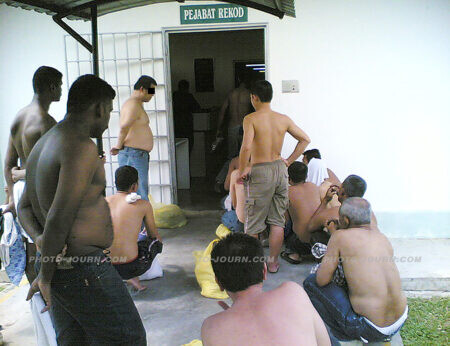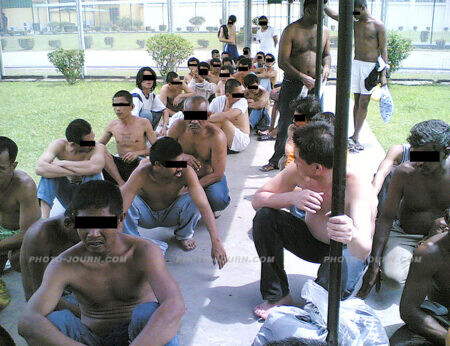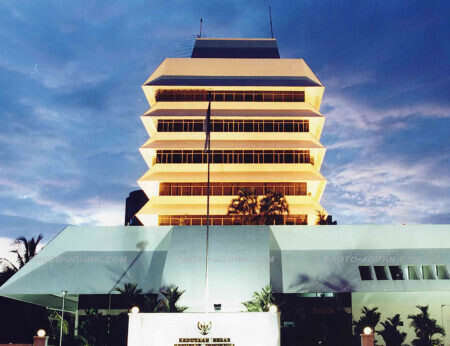When video of a drug trafficker being caned (rotaned) in Malaysia was leaked onto the Internet last week it resulted in headlines and still images from the video appearing in leading newspapers around the world.
It wasn’t that people being caned in Malaysia was something the world hadn’t heard of before, but rather the first time that actual footage or photographs of the brutal and barbaric act of caning prisoners had been seen publicly outside of Malaysia.
The video of the prisoner being caned was rapidly copied from the original posting site, Liveleak.com to video hosting sites around the world.
Caning in Malaysia (and Singapore)
Caning in Malaysia dates back to British colonial times and involves using a wet rattan stick to whip the prisoner on his buttocks, often splitting the skin and leaving scars that can last ten years or more. It is the same method as used in neighbouring Singapore.

Human rights groups globally have condemned the practice of caning prisoners, labeling it as “barbaric” and “inhumane,” while The Bar Council of Malaysia, which represents 8,000 lawyers, called for caning to be abolished and stepped up its campaign against it.
“We are against the death penalty and corporal punishment,” said council president, Ambiga Sreenevasan.
“It (caning prisoners) is against all international human rights norms and the various conventions on torture. It’s inhumane and degrading”.
However, Malaysia’s Internal Security Minister, Datuk Fu Ah Kiow, defended caning, or the rotan as it called locally, claiming it was, “no big deal”.
“The video is used in drug prevention and other anti-crime campaigns. It is deterrence for drug traffickers and drug addicts.
“Let’s not be hypocritical about this. Look at the harm done to victims of drug pushers and drug users, and the increase in violent crime”, he said, adding “we must show more concern to the victims than to the convicts”.
Malaysian drug laws
In Malaysia an individual arrested in possession of more than 15 grams of heroin, 1,000 grams of raw or prepared opium, 40 grams of cocaine, 200 grams of marijuana, or 50 grams of amphetamine, methamphetamine or MDMA are presumed by law to be trafficking in drugs and subject to the death penalty.
Those detected with as little as 2 grams of heroin, 5 grams of cocaine, 100 grams of raw or prepared opium, 20 grams of marijuana or 5 grams of amphetamine, methamphetamine or MDMA are liable to a prison sentence of between two and five years, and between three and nine strokes of the rotan.
While Datuk Kiow would like to have the world believe that caning is reserved only for those who commit serious crimes, this is being somewhat economical with the truth.
Caning can be used to punish more than 40 crimes in Malaysia, including certain white-collar crimes such as criminal misappropriation, criminal breach of trust, and cheating.
Migrant workers the most frequently caned

However, the most often application of the rotan is to the posterior of illegal migrants, asylum seekers, and those who overstay their visit or work visa.
According to P. Ramasamy, formerly a professor at the Center for History, Political Science and Strategic Studies at the Universiti Kebangsaan Malaysia, an estimated quarter of the workforce — 2.5 to 3 million workers out of a working population of nine million — is foreign.
Of this a little less than two million are legal, with the rest living in fear of being stopped on the street and asked for their papers, or midnight raids on their homes or workplaces by authorities.
Much of modern Malaysia was built by foreign labor, including the administrative capital of Putrajaya. In fact, the first person buried in the cemetery there was an Indonesian construction worker killed on the job.
Shamsuddin Bardin, Malaysian Employers Federation Director, says foreign workers are employed in the “three D jobs that Malaysians don’t want – dirty, dangerous and difficult”.
Abuse of migrant workers well-documented

The exploitation and abuse of the migrant workers both by the employers and immigration agents are well-documented and include non-payment of wages, beatings and having their travel documents stolen and then reported to officials as being illegal.
During an illegal worker amnesty in February 2005 more than 100,000 illegal Indonesian workers refused to return home, despite a looming crackdown by Malaysian officials, claiming they had not been paid wages due to them.
The Indonesian embassy in Kuala Lumpur reportedly hired five lawyers to sue the employers who were taking advantage of the amnesty to withhold the workers’ wages. However, the action was withdrawn later after a meeting between Indonesian President Susilo Bambang Yudhoyono and Malaysian Prime Minister Dato Abdullah Ahmad Badawi.
On August 1, 2002, Malaysia amended its immigration act for those overstaying their visa’s. The new Act carries a fine of up to RM10,000 (about US$2,800) and/or a jail term of up to five years, as well as mandatory caning of not more than six strokes of the rotan.
Just nine days later seven Bangladeshi’s being tried in three different courts throughout Malaysia became the first foreigners ordered caned for entering the country illegally.
According to figures released by Malaysia’s Home Ministry in December 2004, 11,473 Indonesians, 2,786 Myanmar’s, 1,956 Filipinos, 708 Bangladeshis, 509 Indians and 1,175 other nationalities were administered 60,000 lashes of the rotan since the laws enactment in 2002, an average of 1,162 people per month and 3.3 lashes per person.
16,000 migrant workers waiting caning
In March 2005 the Asian Centre for Human Rights estimated there were around 16,000 undocumented workers being held in Malaysia awaiting caning.

While people around the world have constantly called on Malaysia to cease the practice of caning prisoners, its lawmakers have instead looked at increasingly hard and humiliating punishments.
In 2002, Nik Aziz Nik Mat, the spiritual leader of Malaysia’s main Islamist opposition party, Pas, called for people convicted of sex crimes to be stoned to death in public in accordance with Islam, while in 2004 Prime Minister and de facto law minister, Abdullah Badawi, said he would ask the cabinet to approve tougher punishments, including for rapists to be caned in public as a deterrent.
In December 2006 Mohamed Aziz, from the ruling National Front coalition, urged parliament to extend the caning of prisoners in Malaysia to include foreign prostitutes, “as a deterrent to others considering coming here to work in the sex industry. If we can impose caning for drug addicts, why can’t we do the same for prostitutes”, he said in a proposal that was supported by at least one other lawmaker.
While the rest of the world might find the caning of prisoners to be Neanderthal in nature, it is doubtful Malaysia’s lawmakers will rush to remove the penalty from the statute books.
In a country suffering skyrocketing crime and increasing Islamic conservatism, the posting of a video of a prisoner being caned on the internet only serves to highlight the extreme penalties some countries mete out to those convicted of crime.
One can’t help to wonder though why Datuk Kiow only mentioned caning being administered to drug traffickers and rapists, and ignored the fact that those subjected the most to this punishment are guilty of little more than trying to find a better life for themselves and their families.
Other Asian countries that impose caning penalties include Brunei Darussalam and Singapore.
Feature video Supplied
Related:
- Visit Malaysia 2007 … why bother?
- Death of maid in Malaysia highlights endemic foreign worker abuse
- “Sadistic” Malaysian employer Yim Pek Ha sentenced to 18-years jail for abusing maid: Released on bail
He has spent extensive periods of time working in Africa and throughout Southeast Asia, with stints in the Middle East, the USA, and England.
He has covered major world events including Operation Desert Shield/ Storm, the 1991 pillage in Zaire, the 1994 Rwanda genocide, the 1999 East Timor independence unrest, the 2004 Asian tsunami, and the 2009, 2010, and 2014 Bangkok political protests.
In 1995 he was a Walkley Award finalist, the highest awards in Australian journalism, for his coverage of the 1995 Zaire (now Democratic Republic of Congo) Ebola outbreak.
Most recently he was the Thailand editor/ managing editor of AEC News Today . Prior to that he was the deputy editor and Thailand and Greater Mekong Sub-region editor for The Establishment Post, predecessor of Asean Today.
In the mid-80s and early 90s he owned JLF Promotions, the largest above and below the line marketing and PR firm servicing the high-technology industry in Australia. It was sold in 1995.
Opinions and views expressed on this site are those of the author’s only. Read more at About me
Latest posts by John Le Fevre (see all)
- Kaavan’s great escape photo special (video & gallery) – November 30, 2020
- A real life fairy tale: Cambodia provides sanctuary to Kaavan, the world’s loneliest elephant (video & gallery) *updated – November 30, 2020
- Death for corruption and press freedom abused as Thailand continues Nth Korean-like slide – July 23, 2015
- Thailand’s young rice farmers boost income, slash costs with switch to organic, AWD method – May 29, 2015

wish we had caning in us less crime here in us
Dear sir/ma,
its very sad when i read this and i dont think there should be chance for bail to this woman who pure hot water to a human being like her and iron her back.for what? this is a bad behaviour in the society i think they supposed to put her in life jail or they should boil water also and pure it on her body and iron her body also.then she can feel and know how the pain is on the body.im sure if she had a Gun she will have kill the woman,and no one will know at all.this type of heartless people are not ment to live in the society.they goverment supposed not to accept her to be bail at all.